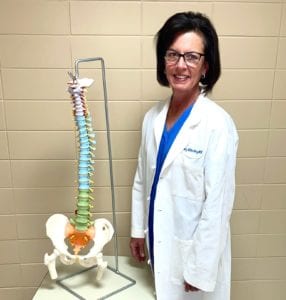Interventional Pain Therapy
 Thank you for choosing Abbeville General Hospital for your Interventional Pain Therapy. The staff here is committed to exceeding your expectations by providing you with respectful, compassionate, quality care, while helping you achieve a greater peace of mind. We seek to enhance the quality of life for those patients who come to us for treatment.
Thank you for choosing Abbeville General Hospital for your Interventional Pain Therapy. The staff here is committed to exceeding your expectations by providing you with respectful, compassionate, quality care, while helping you achieve a greater peace of mind. We seek to enhance the quality of life for those patients who come to us for treatment.
We have created a section of this website to offer our customers and referring physicians information about Interventional Pain Therapy, and to help guide you through the process of scheduling an appointment. Please read this carefully as the instructions will help you move smoothly through each phase of your treatment and recovery.
 Our Services
Our Services
Abbeville General Hospital Interventional Pain Therapy provides therapeutic outpatient services for individuals experiencing pain in the lower back and lower extremities. A new patient visit starts with a full assessment, including medical and surgical history. An individualized plan to alleviate the pain is formulated according to each patient’s physical, psychological, and socio-cultural needs.
The following services are available for Chronic Pain:
- LESI ( Lumbar epidural steroid injection),
- Ilioinguinal nerve block,
- Trigger point injections ( single/multiple),
- Intercostal nerve blocks
- Sacroiliac joint injections
The Interventional Pain Therapy department is located within the main facility at Abbeville General Hospital.
For Referring Physicians
Thank you for referring your patient to Abbeville General Hospital Interventional Pain Therapy. We value our partnership with you in ensuring the highest level of care for your patient.
Please complete and send the Physician Referral Form along with recent MRI reports (must be within last 12 months), medical/surgical history, and current medication list.
For Patients
Click each item below to find out more information
What to Expect with any Procedure
Before your procedure you can expect:
To review pre-procedure instructions.
To sign a consent form, after the risks and benefits of the procedure have been explained to you by a doctor.
To have the site of your procedure marked.
To be connected to monitors for safety.
To be instructed to stop taking Aspirin, NSAID’s (non-steroidal anti-inflammatory drugs), and/or any blood thinners.
After your procedure you can expect:
To be monitored for 20 minutes to one hour in our post-procedure area.
To have any questions about your procedure or follow-up answered.
To receive specific discharge instructions, including a phone number to call in case of questions.
Increased pain at the site of injection, as the needles may cause some bruising to the tissue. Normally this resolves very quickly with rest, ice, and other conservative measures. You may also experience a transient worsening of your normal pain, or a change in location of discomfort which typically resolves within the first two days.
You may have weakness or numbness in your legs, which disappears within 1-2 hours.
If you have received steroids, you may experience a temporary rise in blood pressure or blood sugar, insomnia, changes in menstrual flow, weight gain, and increased risk of mania in bipolar disorder. Most patients do not notice ill effects. The steroids may take 48 hours to have an effect, and this effect may take two weeks to peak.
If you have received local anesthetic, you may notice this wearing off in the first 6 to 8 hours. You may also notice some increase in pain after the local anesthetic wears off and before the steroids “kick in”.
How to Make an Appointment
You will be called by one of the Interventional Pain Therapy staff members to schedule your procedure. At that time, a pre-procedure nurse visit will be scheduled and any questions you may have will be answered. We look forward to seeing you in the near future.
Our department phone number is: (337) 898-6563.
General Procedure Instructions
For your first visit with us, we recommend that you:
- Bring all of your current medications in original bottles (both prescription and over-the -counter).
- Write down questions for your doctor—especially the reason for your visit today.
- Have a responsible adult accompany you and drive you home after your procedure.
Discontinue any medications with blood-thinning effects, after instructions from the scheduling nurse. Our staff will obtain permission from the prescribing physician for you to hold this medication.
Alert your Interventional Pain Therapy staff and physician if you have an allergy to shellfish, latex, contrast dye, local anesthetic, or steroids.
Take your scheduled medications – except blood thinners – on the day of the procedure. If you are diabetic, check your blood sugar before breakfast. If your fasting blood sugar is above 200, call the Interventional Pain Therapy department. Your procedure may need to be rescheduled.
If you have been ill with a fever or have taken antibiotics in the two weeks before your appointment, please notify the Interventional Pain Therapy department. You may need to be rescheduled to reduce the risk of serious infection.
Notify your Interventional Pain Therapy doctor if you have had any changes in liver or kidney function as this may affect the medications given during the procedure.
Notify your Interventional Pain Therapy doctor if you might be pregnant because both x-rays and some medications may be harmful to the fetus.
All patients must be discharged in the care of a responsible adult driver. Even if you are not having sedation, some procedures can result in temporary weakness or numbness of your legs secondary to an effect of the numbing medicine, making it difficult to drive.
Epidural Steroid Injection
- Changes in the disk (a soft, gel-like cushion between two vertebrae) due to wear and tear
- A reduction in the space within the spinal cord
- Slipped or herniated disc
- Sciatica (shooting pain that radiates down the buttocks and the back of the leg due to compression of the nerve)
- Pain that develops after a surgery of the spine
What you can expect:
- You will be positioned on your stomach.
- You will be connected to monitors.
- Your skin will be carefully cleaned and draped to keep the area sterile.
- An X-ray beam will be used to identify the area of the injection.
- You will receive numbing medication at the site of the injection.
- After the needle is placed, the medication is injected. You may feel a slight worsening of your normal pain as the medication is injected near the structures causing your pain. This should quickly resolve.
Risks (Rare):
- Bleeding
- Infection
- Nerve damage
- Allergic or toxic reaction to the local anesthetic, which very rarely can result in seizures, cardiac arrest, or death.
- Headache. Notify your doctor if you experience a headache, worsened by standing and relieved by lying down, as there are additional treatments for this.
Benefit:
- Pain Relief
You may need a series of injections in order to derive maximal benefit. Depending on your reason for pain, you may get complete relief; most people derive several weeks to months of relief with these injections.
Trigger Point Injection
- Your position will depend on the muscles that need to be injected.
- You may be connected to monitors to obtain vital signs before and after the procedure.
- This procedure does not require sedation.
- Your skin will be carefully cleaned to keep the area sterile.
- A needle will be placed into each trigger point, and the medication injected. Occasionally this will cause your muscles to twitch or reproduce your typical pain; this should be transient.
Risks (Rare):
- Bleeding
- Infection
- Nerve damage
- Toxic reaction to the local anesthetic, which very rarely can result in seizures, cardiac arrest, or death.